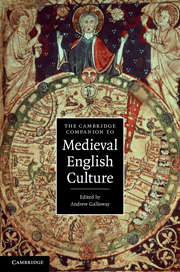Book contents
- Frontmatter
- Introduction
- Part one Theaters of culture: political, legal, material
- Part two Cultural ideals and cultural conflicts
- Part Three Literacies, languages, and literatures
- 7 Visual texts in post-Conquest England
- 8 Literacy, schooling, universities
- 9 Anglo-Latin literature in the later Middle Ages
- 10 The vernaculars of medieval England, 1170-1350
- 11 English literary voices, 1350-1500
- Part four Legacies and re-creations
- Guides to further reading
- Index
10 - The vernaculars of medieval England, 1170-1350
from Part Three - Literacies, languages, and literatures
Published online by Cambridge University Press: 28 July 2011
- Frontmatter
- Introduction
- Part one Theaters of culture: political, legal, material
- Part two Cultural ideals and cultural conflicts
- Part Three Literacies, languages, and literatures
- 7 Visual texts in post-Conquest England
- 8 Literacy, schooling, universities
- 9 Anglo-Latin literature in the later Middle Ages
- 10 The vernaculars of medieval England, 1170-1350
- 11 English literary voices, 1350-1500
- Part four Legacies and re-creations
- Guides to further reading
- Index
Summary
The Early English homiliary, Cambridge University Library (CUL) MS Ii.1.33, contains sermons and saints' lives and part of the Old English Heptateuch attributable to the prolific late tenth-century religious writer, Ælfric, abbot of Eynsham, whose corpus of work in English is the largest belonging to any single, known author before Chaucer. Datable to the later twelfth century, and with a provenance of Ely, this English manuscript represents, for many scholars of medieval literature, the last vestiges of the pre-Conquest Old English textual tradition. The extensive codex seems, at first glance perhaps, determinedly replicative, containing texts that virtually all belong in terms of composition to a period almost two centuries prior. The language of the homilies and hagiographies is predominantly late West Saxon, the standard dialect preferred by Ælfric and many English writers in the late tenth and eleventh centuries. Yet despite this old-world façade, a closer look inside the manuscript reveals a dynamic set of texts, linked by intensive editorial activity to the contemporary world of the late twelfth-century multilingual monastery, replete with evidence to illustrate the literary, religious, and intellectual milieu that facilitated the book's compilation.
- Type
- Chapter
- Information
- The Cambridge Companion to Medieval English Culture , pp. 217 - 236Publisher: Cambridge University PressPrint publication year: 2011
- 3
- Cited by



